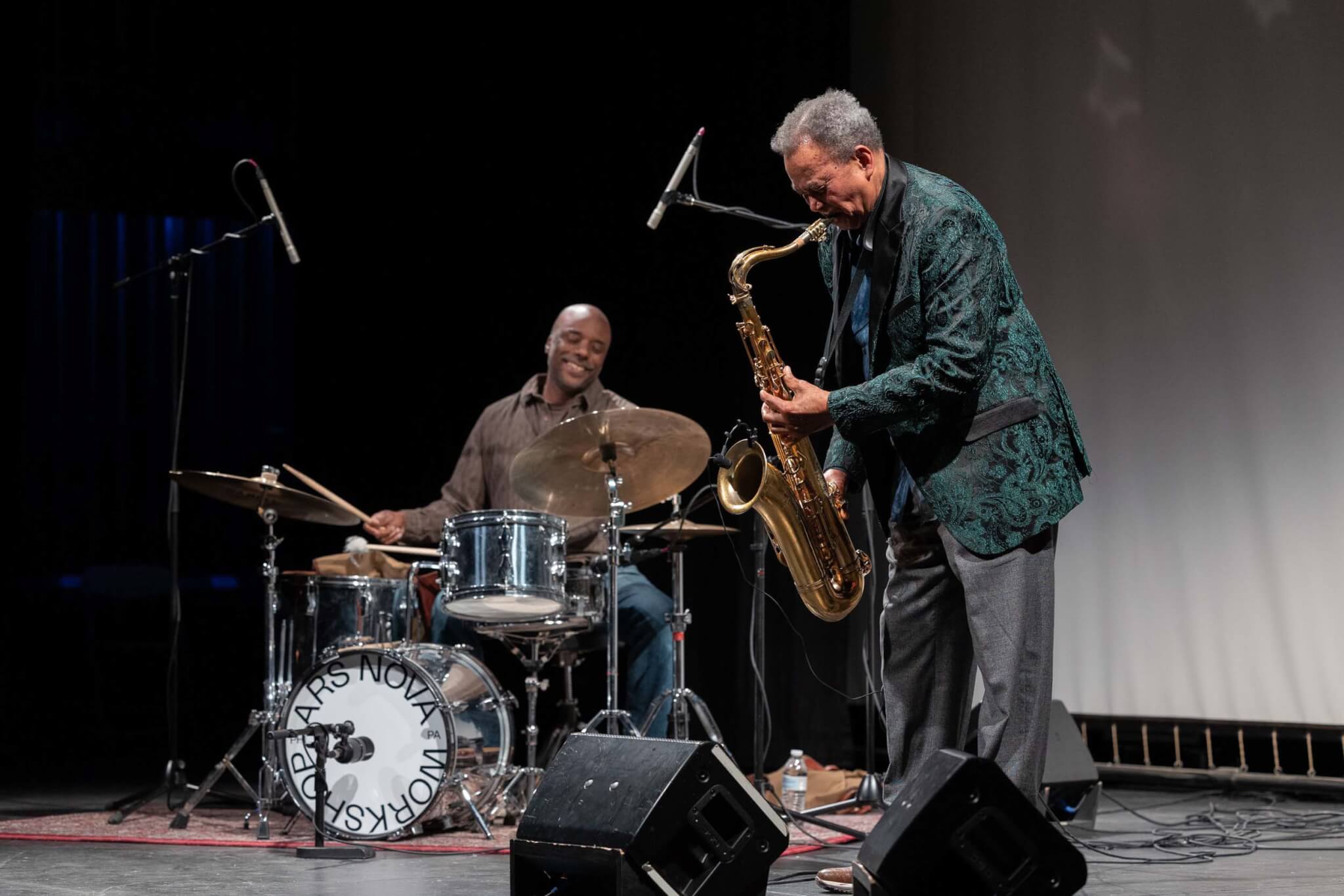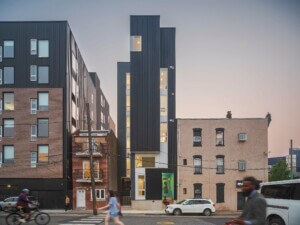On a Monday afternoon, ninety or so people gathered loosely around Theaster Gates’s Monument in Waiting, installed on Drexel University’s Korman Family Quad. The piece itself—a concrete sculpture composed of three rectangular prisms of different dimensions and something vaguely resembling a Doric column tipped onto its side, all scattered on a thin plinth made up of 45 tiles—served as a stage for a performance by Mind Maintenance, a duo composed of bassist Josh Abrams and drummer Chad Taylor. Abrams and Taylor played the guimbri, a three-stringed instrument traditionally used by the Gnawa people of Sub-Saharan Africa, and the mbira, a lamellophone traditional to the Shona people of Zimbabwe, respectively. The music, percussive and steady, invited people into a swaying trance, setting the mood for the rest of the evening. On the tipped-over column, Gates sat looking at the musicians and chit-chatting with a rotation of attendees.
The occasion was a symposium titled The Monument We Make, hosted by Drexel and presented in partnership with Ars Nova Workshop, Gray gallery, Forman Arts Initiative, and Philadelphia Contemporary. The monument itself, created by Gates amidst the George Floyd protests during the summer of 2020 and first exhibited at the Parrish Art Museum in Water Mill, New York, was cosponsored at Drexel by Philadelphia Contemporary, Forman Arts Initiative, and Drexel. People stayed through the whole performance and lingered after so that they could then file into the at-capacity 424-seat Mandell Theater across the street for a panel discussion and Q&A featuring Gates, Mellon Foundation president Elizabeth Alexander, and Monument Lab director and cofounder Paul Farber. Their discussion, moderated by Antoinette Westphal College of Media Arts & Design dean Jason Schupbach, circled around questions of public history, representation, and commemoration. The exchange was undergirded by an unstated but seemingly shared agreement that the current “monument landscape,” in the words of Farber, leaves something to be desired.

“Not all monuments have to be good,” offered Gates when prompted by Schupbach to expand on his process for creating Monument in Waiting, a piece whose abstract forms are meant to invite people to, in Gates’s words “read their own stories” into them. A phrase etched into the vertical face of one of the prisms—“until real heroes bloom, / this dusty plinth will wait”—suggests a critique: that we might not yet have adequate heroes to memorialize via traditional representation.
Alexander and Farber, whose respective institutions have partnered in Philadelphia as part of the The Monuments Project, an effort to “transform the nation’s commemorative landscape by supporting public projects that more completely and accurately represent the multiplicity and complexity of American stories,” provided context for Gates’s piece, in particular its critique of traditional monument-making: statues of people with plaques bearing names and dates. Farber shared that only 1 percent of all Civil War monuments use the word slavery in their text or metadata, and that only 3 percent of Confederate monuments mention defeat. “Monuments act like history, but they’re not history,” said Alexander when underscoring the need to alter how monuments are made and perceived.


Following the discussion, Drexel University president John Fry and Michael Forman, cofounder of the Forman Arts Initiative, presented Gates with an Honorary Doctorate of Arts And Humane Letters. Gates expressed joy at the occasion. “I know Philly people like Philly people, so I’m honored to think I could be a brother in this city.” The evening was capped by a largely improvisational jazz performance featuring Abrams on the upright bass, Taylor on a seven-piece drum kit, and saxophonist Odean Pope. Their performance was impressive, but by the end, most people had trickled out—they, it seems, had already seen what they’d come to see.
Marianela D’Aprile is a writer in Brooklyn. She is the deputy editor of New York Review of Architecture.











